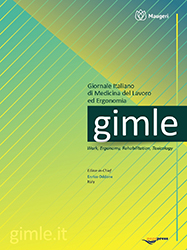Music as support to occupational therapy
All claims expressed in this article are solely those of the authors and do not necessarily represent those of their affiliated organizations, or those of the publisher, the editors and the reviewers. Any product that may be evaluated in this article or claim that may be made by its manufacturer is not guaranteed or endorsed by the publisher.
Authors
Habilitation, rehabilitation and promotion of well-being is the ultimate goal of the occupational therapy process. Occupational therapy interventions take advantages from interdisciplinary approach, implying that classic rehabilitative models are constantly enhanced by updated evidences in rehabilitation literature and enriched with competences from different fields. Recent literature has showed how music interventions can improve clinical and rehabilitative outcomes at different levels. Physical or occupational therapists, caregivers and care staffs are frequently involved in providing music interventions with or without the support of a music therapist. In particular, occupational therapists can use music as support to the rehabilitation of daily living activities and, in general, as a complementary tool of their work. This paper wants to stress the implementation of music and music therapy techniques and related specific training programs in the field of occupational therapy, pointing and summarizing main workable evidence-based approaches with music in occupational therapy settings.
How to Cite

This work is licensed under a Creative Commons Attribution-NonCommercial 4.0 International License.
PAGEPress has chosen to apply the Creative Commons Attribution NonCommercial 4.0 International License (CC BY-NC 4.0) to all manuscripts to be published.






